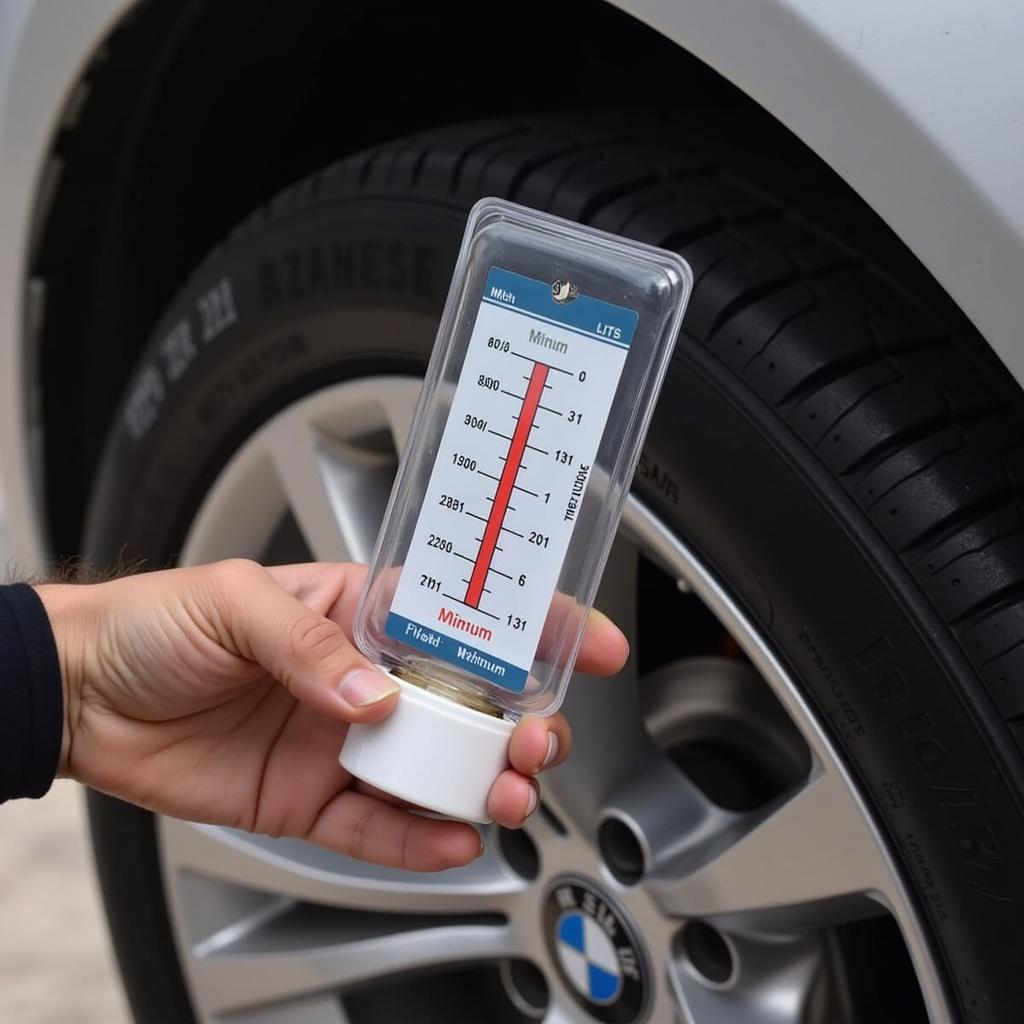The dreaded brake warning light on your 2013 BMW can be a source of anxiety. Whether it’s a persistent glow or an intermittent flicker, understanding how to diagnose and address the issue is crucial. This comprehensive guide will explore the common causes of a 2013 BMW brake warning light, provide step-by-step troubleshooting advice, and offer solutions to help you turn off that pesky light.
If your car battery is consistently losing charge, that could be related to your brake warning light. Check out this article about why your car battery keeps losing charge.
Understanding Your BMW’s Brake Warning System
The brake warning light is part of your BMW’s sophisticated safety system. It’s designed to alert you to potential issues within the braking system, ranging from low brake fluid to more serious problems like worn brake pads or a malfunctioning ABS system. Ignoring this warning can compromise your safety and potentially lead to costly repairs.
Common Causes of a 2013 BMW Brake Warning Light
- Low Brake Fluid: This is the most common culprit. Brake fluid levels naturally decrease over time as your brake pads wear down.
- Worn Brake Pads: Thin brake pads trigger a sensor that illuminates the warning light.
- Faulty Brake Sensor: Sometimes, the sensor itself can malfunction, even if the brake pads are fine.
- ABS Issues: Problems with the Anti-lock Braking System (ABS) can also trigger the brake warning light. This often requires professional diagnostics.
- Parking Brake Engaged: It might seem obvious, but ensure the parking brake is fully released.
Troubleshooting the 2013 BMW Brake Warning Light
- Check the Parking Brake: Make sure it’s fully disengaged.
- Inspect Brake Fluid Level: Locate the brake fluid reservoir under the hood and check the fluid level. It should be between the minimum and maximum markers.
- Visually Inspect Brake Pads: If possible, take a look at your brake pads through the wheel spokes. Look for significant wear. If they appear thin, it’s time for a replacement.
- Scan for Diagnostic Trouble Codes (DTCs): A professional-grade diagnostic scanner can pinpoint specific issues within the braking system by reading DTCs.
If you’re unsure about any of these steps, consult a qualified mechanic. Brakes are essential for safety, and it’s best to err on the side of caution.
Knowing how to connect your iPhone to your BMW’s Bluetooth system for playing music can make your driving experience more enjoyable. Learn more here about iPhone Bluetooth connection to car radio.
When to Seek Professional Help
While some brake warning light issues are simple fixes, others require specialized knowledge and tools. If you’re uncomfortable working on your car’s brakes or if the problem persists after checking the basics, it’s time to seek professional help. A qualified BMW technician can accurately diagnose and repair any underlying issues within your braking system.
“Ignoring a brake warning light is like ignoring a flashing ‘check engine’ light—it’s a gamble you don’t want to take,” says Michael Schmidt, a seasoned BMW technician with over 20 years of experience. “Brake systems are complex, and attempting DIY repairs without proper knowledge can lead to further damage and compromise safety.”
BMW 2013 Brake Warning Light Turn Off: Solutions
- Add Brake Fluid: If the fluid is low, add the correct type of brake fluid recommended by BMW.
- Replace Brake Pads and Sensors: If the pads are worn, replace them along with the brake pad wear sensors.
- Address ABS Issues: This usually involves professional repair or replacement of ABS components.
You can find useful information about the signs of a bad car battery here: signs a battery is going bad.
 Checking the brake fluid reservoir in a BMW
Checking the brake fluid reservoir in a BMW
“Regular brake system maintenance is key to preventing warning lights and ensuring optimal performance,” adds Schmidt. “Just like regular oil changes, brake inspections should be part of your routine car maintenance schedule.”
Conclusion
Turning off the brake warning light on your 2013 BMW requires a systematic approach, starting with understanding the potential causes and performing basic troubleshooting steps. While some fixes are DIY-friendly, don’t hesitate to seek professional help for complex issues or if you’re unsure about any aspect of brake repair. Addressing the problem promptly ensures your safety and prevents further damage to your BMW’s braking system. Remember, your brakes are your lifeline on the road, so prioritize their maintenance and never ignore a warning light.
If you’re facing problems streaming music via Bluetooth in your car, check out this helpful guide: how to bluetooth music to your car radio.
FAQ
- Can I drive my BMW with the brake warning light on? It’s not advisable. While you might still be able to brake, the warning light indicates a potential issue that could compromise braking performance.
- How often should I check my brake fluid level? It’s a good practice to check your brake fluid level at least once a month.
- How long do BMW brake pads last? Brake pad lifespan varies depending on driving habits and conditions, typically lasting between 30,000 and 70,000 miles.
- What type of brake fluid should I use in my 2013 BMW? Consult your owner’s manual for the correct brake fluid specification. Using the wrong type can damage the braking system.
- Is it expensive to fix ABS problems? The cost depends on the specific issue, ranging from a simple sensor replacement to more complex repairs involving the ABS module.
- How can I prevent future brake warning light issues? Regular brake inspections and maintenance, including timely brake pad and fluid replacements, are crucial for preventing future problems.
- Can a low battery cause the brake warning light to come on? While unlikely, a severely discharged battery can sometimes cause erratic warning light behavior. It’s essential to diagnose the root cause.
Are you having trouble differentiating between a bad alternator and a failing battery? This article can help: signs of a bad alternator vs bad battery.

